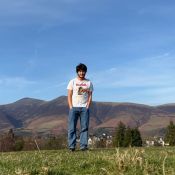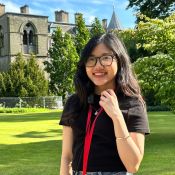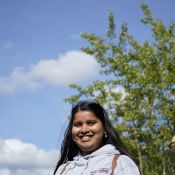
Reputation for high-quality education
Coming from Mexico, I wanted my postgraduate experience to be more than just academic. It had to challenge me culturally, creatively, and personally. The UK offered all of that. It has a strong reputation for high-quality education, access to diverse perspectives from around the world, and a thriving arts scene. I chose the University of Edinburgh because of its strong reputation in film and cultural studies, and the way my program combines theory with practical curatorial work. University life here is vibrant, there are thousands of societies to join. I joined the Photography and Jazz society where I was able to meet new skills and friends from all over the world.
I lived in university accommodation, sharing a kitchen with seven other students from different countries. At first, adjusting to a shared space required communication between flatmates, especially when you’re used to your own spice cabinet back home. Now, I see it as part of my whole experience studying in the UK. We swap recipes, share late-night tea, and sometimes discover how differently people define "clean." If you’ve ever been to Mexico, you know the sunshine allows for long days in the park in short sleeves. Edinburgh’s weather, on the other hand, teaches you that in other parts of the world the seasons are noticeable and learning how to layer clothes is essential! Rain and wind are common, but the reward is watching the city’s stone streets and green hills change with the light, it’s magical in its way.
By studying Film Exhibition and Curation, I was able to explore how films are shared with audiences, from major festivals to community screenings. I valued that the University professors pushed me to think critically, experiment with creative projects, and connect cinema with larger cultural conversations. It was the perfect place to merge my passion for film with my interest in how stories are presented and experienced. Walking through Edinburgh sometimes feels like stepping into a perfectly framed shot. Between the medieval Old Town, the elegant Georgian New Town, and the dramatic backdrop of Arthur’s Seat, there’s plenty of inspiration. The city also has a lively arts calendar, from the famous Fringe Festival to small, intimate film screenings.
One of the best parts of studying here is meeting people from all over the world. My friends come from places I’d only read about before, and our conversations range from comparing national cuisines to discussing cinema across cultures. In my free time, I explored hidden cafés, visited free museums, or took day trips to the Highlands. While I’ve studied in English before, doing a full master’s degree in it, especially in an academic setting, can be intense. Sometimes my thoughts start in Spanish, switch to English, and land somewhere in Spanglish. The good news is that you improve every week, and the professors here are supportive.
If there's one thing I wish I’d known before packing my bags, it’s how fast time flies here. A year feels long before you arrive, but between classes, social life, and exploring Scotland, it goes by quickly. My advice is to arrive with an open mind, a good raincoat, and a willingness to try things outside your comfort zone. You might just find a new version of yourself.
- Jorge

Broadened my academic horizons
After 16 months since the start of my program, I can confidently say that my experience as a PhD student in Applied Mathematics at the School of Mathematics of the University of Edinburgh has been deeply rewarding, thanks to the institution’s high academic standards and its dynamic research environment. From the very beginning, I have progressively developed my research project, focused on the study of the interaction between electromagnetic waves and matter, actively contributing to scientific output and publishing results in collaboration with experts in the field. I have also taken courses directly related to my work, both at the School of Mathematics and the School of Physics, which has strengthened my interdisciplinary background.
The School of Mathematics offers extensive opportunities to carry out research stays at other universities and to attend international conferences, which has significantly broadened my academic horizons and allowed me to build valuable networks with researchers from around the world. During this time, I completed a one-month research stay in Pennsylvania, USA, and in October I will participate in two international conferences.
Furthermore, the School has given me the opportunity to work as a tutor for various undergraduate mathematics courses, an experience that has complemented my academic training, enhanced my teaching skills, and sparked my interest in pursuing an academic career even before completing my studies.
- Hector Miguel

Why I Chose to Study in the UK Over Norway
“Why on earth would you pay a small fortune to study in the UK? You could have done a free master’s degree at home in Norway!”
This is one of the most common questions I’ve been asked over the past year, both by friends in Norway and abroad. And honestly, I can see why people wonder. With sky-high tuition fees, steep living costs, and a weak currency exchange, the UK has unfortunately become a less attractive destination for international students. Add to that the post-Brexit bureaucracy, which can be as unhelpful as it is complicated, and it’s not exactly the easiest move to make.
Still, one year after starting my degree at the University of Sussex, I can confidently say that moving to Brighton was one of the best decisions I’ve ever made. Here are three reasons why:
A Choice for Ambitious Students
It’s widely agreed that British higher education is world-class. With the founding of the University of Oxford in 1096, Britain and education have gone hand in hand for almost 1,000 years. Today, UK universities consistently rank among the top 10 globally across most disciplines. This was, of course, in the back of my mind when I chose Sussex – alma mater to the world’s largest faculty of International Relations. Walking onto campus for the first time and seeing the red-brick buildings standing proudly against the backdrop of the South Downs honestly felt like stepping into Hogwarts. I quickly realised this was a place with high expectations – both of itself and of me as a student.
While the teaching lived up to my expectations, I often learned the most outside the classroom. Surrounded by some of the sharpest minds in International Relations, I had access to an entire network of people from all over the world, each with their own experiences and perspectives. I often felt I learned more about the syllabus over a pint at the local pub, hearing insights from classmates from India, Japan, and the US. These conversations not only broadened my perspective but also gave me a network of ambitious, intelligent people who have become both professional allies and friends.
The Happiest Student City in the UK
Year after year, Brighton is ranked as the happiest city in the UK, and it didn’t take me long to see why. When I arrived in September, I was immediately met with an atmosphere that was both relaxed and full of energy. Beach life is at the heart of Brighton – from its iconic pebble beach and the long pier lined with rides and small shops, to the pastel-coloured sunsets. Grabbing a coffee at Pink Moon before a walk along the promenade quickly became one of my morning rituals. The city is full of quirky cafés, vintage shops, and small galleries – meaning it’s almost impossible to get bored.
One of Brighton’s greatest strengths is its diversity. The city has one of the UK’s largest and most visible LGBT+ communities, and its Pride celebrations are among the most famous in Europe. For me, that was a green flag – a city that not only accepts but celebrates difference. The people I met were open, respectful, and warm – all with that characteristic British bluntness and dry humour. The surrounding nature is just as charming. The rolling green hills and small villages of the Sussex Downs offered the perfect weekend escape. One personal highlight was when my class decided to walk to Lewes, a nearby town just a few kilometres away. Brighton became more than just a student city – it was a place that encouraged me to be myself, while giving me breathing space in an otherwise intense study year.
Fieldwork and Real-World Experience
Another reason I chose the University of Sussex was its Dissertation with Placement programme. This optional track lets students write their master’s thesis while working with an organisation closely tied to their research topic. Through this, I got to work alongside industry experts in my chosen field – and carry out four weeks of independent fieldwork in Argentina.
Some organisations even pay their placement students, and for those that don’t, there are a range of scholarships available to help cover costs. This was not only a fantastic springboard into the job market, but also a unique and exciting way to travel during my studies. Combining a prestigious UK master’s degree with hands-on fieldwork experience is highly sought after in the job market – something I’ve already seen reflected in job interviews since.
“But Should I Move?”
A UK master’s degree is intense. The entire programme is completed in under 12 months, and the learning curve is steep. Each semester lasts just 12 weeks, ending with one major submission or exam. In my programme, International Political Economy, I had two core modules in the autumn, two electives in the spring, and the summer to write a 10,000-word dissertation. Each module required either a 5,000-word final exam paper or an equivalent set of assignments.
This was a big jump from the pace I was used to at bachelor’s level in Norway, and it took time to adjust to the deadlines. Another unexpected challenge was the difference in academic writing styles: British academia expects you to clearly state your position early in the text – much more than is common in Norway. That took some practice, but with supportive and engaged professors, the transition was manageable.
For me, this became more than just a degree. It was a year of academic and personal growth, new friendships, unforgettable experiences – and an education that has already opened doors.
If you’re considering it, my answer is simple: Yes, it’s expensive and demanding. But for me, it was worth every single penny.
- Håkon

5 Things I Love About Studying at the University of Salford
Studying in the UK has been a life-changing experience for me, and the University of Salford has played an important part in making that experience so rewarding. From the academic environment to personal support, there are many aspects of Salford that I truly appreciate. Among them, five things stand out as the most important during my time here, which have enhanced my academic journey and personal growth.
The Clifford Whitworth Library
One of my favourite places on campus is the library. What I love most is that it is open 24/7, allowing me to study at a time that suits my schedule. The library offers a variety of study areas, including individual booths, group study rooms, and silent areas, allowing every student to choose the most suitable environment for their needs.
In addition, the library provides access to hundreds of physical and online resources, including books, journals, articles, and databases. This has been incredibly useful for my research and assignments. I don’t have to worry about finding credible sources, because everything I need is available through the university’s systems. It’s a perfect place not only for studying but also for gaining deeper knowledge and developing academic skills.
Modern and Student-Friendly Facilities
The University of Salford has well-equipped facilities that serve a wide range of learning purposes. The lecture rooms are modern and designed to enhance both individual and group learning. Each room is fitted with projectors or large screens, PCs, whiteboards, and accessible charging points for laptops and phones. These small but important details make studying much more convenient and efficient.
One thing I particularly like is how the spaces are designed to encourage collaboration. Many rooms have flexible seating arrangements that allow students to work together easily. This setup is perfect for group assignments, discussions, and workshops. I can see that my university understands how important interaction and teamwork are in today’s learning environment.
Support Services
From the moment I arrived, I was impressed by the range of support services offered at the University. askUS, Salford’s student support service, is always available to help students with any general questions or concerns, from enrolment to daily life on campus. For academic matters, students can ask for advice from academic tutors about coursework, study techniques, and time management. There are also dedicated services for accommodation, finance, wellbeing, and careers. All these departments are focused on helping students succeed both during and after their time at university.
Personally, I’ve found the Careers and Enterprise team particularly helpful. They offer 1-1 appointments for CV advice, interview preparation sessions and job fairs. These services have given me a clearer idea of how to prepare for life after graduation, and I feel much more confident about entering the job market.
Practical and Career-Focused Curriculum
As a master’s student, I was keen that the curriculum would be practical focused helping me to prepare for a real-world career after graduation. The modules on my course are designed based on Chartered Institute of Personnel and Development (CIPD) standards. This means the content is aligned with industry expectations, making it easier for graduates to apply what they’ve learned in real-world settings. The practical approach includes case studies, group projects, and real business cases that help students understand how theoretical knowledge can be used in the workplace. I believe this training is essential for preparing students for future careers, and it’s something that makes the University of Salford stand out.
Supportive and Respectful Lecturers
Another highlight of studying at the University of Salford is the lecturers. They are not only knowledgeable but also incredibly supportive. My lecturers at Salford Business School always encourage us to do our best, and they regularly give positive feedback to help us improve. I appreciate how they focus on building students’ confidence rather than just pointing out mistakes.
Moreover, they respect each student’s opinions and encourage open discussions in class. I’ve never felt judged for sharing a different perspective. Instead, I’ve felt valued and listened to. This open and inclusive atmosphere makes learning much more engaging and enjoyable.
Conclusion
In conclusion, my experience at the University of Salford has been full of positive moments and valuable lessons. The 24/7 library, modern facilities, student support, encouraging lecturers, and career-focused curriculum are just some of the many things I love about studying here. These aspects have not only helped me grow academically but also personally and professionally. I feel grateful to be part of such a supportive and forward-thinking university, and I truly believe that this experience will have a lasting impact on my future.
- Cam Tu

Finding My Way Across The Pond
Studying abroad was something I wanted to do but never really had the opportunity. When I started considering law school and was researching things like the LSAT (law school admission test), Canadian law schools, articling (a required internship period) and other steps I may need to take to reach my goal of practising law, I came across many blogs and articles suggesting I may be able to reach that goal outside of Canada. This immediately piqued my interest.
Upon starting my research on international study, I found myself incredibly overwhelmed with the sheer number of schools and directions I could go to pursue my law career. I knew I wanted to be in Europe and, with my area in Canada being a common law system, it helped me narrow it down to the UK. Still feeling lost, I decided that there must be a community of people who can help me out. This led me to Across the Pond. I am so grateful to have stumbled upon this company on google that day. They walk you through the entire process of applying internationally and help you narrow down the schools based on your preferences and any existing qualifications. My student advisor with Across the Pond was so helpful and kind guiding me through the process of applying.
Why University of Sussex? Why Brighton?
The University I attend (University of Sussex) is slightly outside of Brighton which was another selling factor for me since I am more of a country girl. I’ve enjoyed the vast amounts of trails surrounding the university in Stanmer Park on numerous occasions. Something Canadian applicants should know is that there is a significant Canadian population attending school here, especially law! The student housing that’s offered is also a great way to meet people and make connections. I love the ‘small town city” feel that Brighton offers with cute markets and social events. Being from the west coast of Canada, the true selling factor of Brighton was its proximity to the ocean. I grew up on a small island and the ocean has always felt like home.
- Natasha





